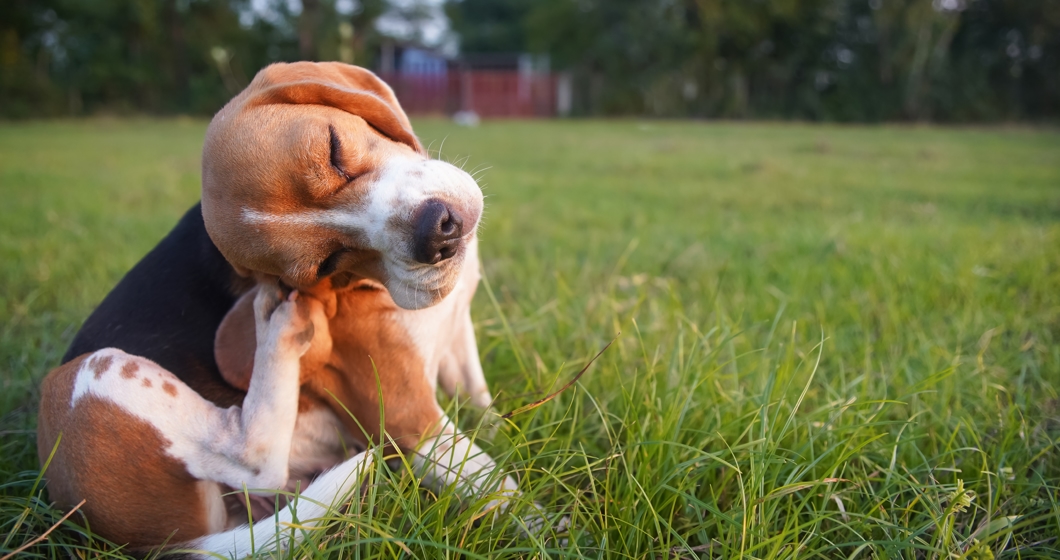If your dog is constantly scratching, biting, or licking their skin, you’re not alone—and you’re right to be concerned. August is Itchy Pet Awareness Month, a time dedicated to helping pet owners recognize the signs of skin discomfort and get the right care for their furry companions. Dogs can't tell us when they're itchy or uncomfortable, but excessive scratching can be more than just an annoyance—it could be a sign of an underlying health issue. As a pet owner, it's important to understand what’s normal, what’s not, and how to help.
Why Is My Dog So Itchy?
The scientific term for itchiness is pruritus, and some level of scratching is perfectly normal. Like us, dogs may scratch occasionally to relieve a minor irritation. But when scratching becomes frequent or intense—causing skin redness, hair loss, or even open sores—it’s time to help.
If your dog seems more irritated than usual, here are some common reasons why:
Allergies: Dogs can be allergic to pollen, mold, dust mites, or certain foods.
Fleas and Parasites: Flea bites are one of the most common causes of itching in dogs.
Dry Skin: Changes in weather, diet, or grooming products can dry out your dog’s skin.
Skin Infections: Bacterial or fungal infections often cause itching, odor, and hair loss.
Hot Spots: These are inflamed, infected areas that form from constant licking or scratching.
If the itching persists for more than a few days or your dog’s skin looks irritated, it’s best to schedule a veterinary visit.
When Can Scratching Become a Problem?
Scratching isn’t just irritating—it can lead to bigger health concerns. When dogs scratch excessively, they can damage their skin, potentially allowing infections to occur. Constant discomfort can also affect their behavior, leading to anxiety, restlessness, and poor sleep. Left untreated, a small itch can turn into a long-term health issue.
Common Dog Skin Conditions
Dogs are prone to several skin conditions that can cause chronic itching, including:
Atopic Dermatitis: A common allergy-related skin disorder in dogs.
Flea Allergy Dermatitis: A hypersensitivity to flea bites that can cause severe reactions.
Yeast Infections: Often found in ears, paws, or skin folds, causing itching and a musty odor.
Mange: Caused by mites, this condition can lead to extreme itching and hair loss.
Ringworm: A fungal infection that appears as circular patches of hair loss and redness.
Diagnosing the exact cause often requires a vet visit, where your pet may undergo skin tests or allergy testing.
Dog Itching Remedies
There are some steps you can take at home to help relieve mild itching:
Keep Your Dog’s Environment Clean: Regularly clean their bedding and favorite spots to reduce allergens.
Use Vet-Approved Shampoos: Special medicated or hypoallergenic shampoos can help soothe skin.
Brush Regularly: Brushing helps remove allergens and keeps your dog’s coat healthy.
Maintain Flea and Tick Prevention: Year-round protection is key to avoiding itchy pests.
Important: Never use human medications or itch-relief products on your dog, as many can be toxic to them. Always consult your vet before trying new treatments.
If your dog’s itching is more serious, your vet may prescribe:
Antihistamines or Anti-itch Medications
Topical Treatments or Medicated Baths
Antibiotics or Antifungal Medications (for infections)
A Diet Change (to eliminate food allergens)
Supplements like fish oil for skin health
How to Prevent Itchy Skin in Dogs
Here are some proactive ways to keep your dog’s skin healthy:
Grooming: Regular brushing and baths with appropriate products can help prevent the buildup of dirt and allergens.
Diet: Feed your dog a well-balanced diet rich in omega-3 fatty acids and essential nutrients.
Vet Checkups: Routine visits help catch issues early before they become chronic.
Exercise: Physical activity supports overall health, including skin and coat condition.
Clean Living Space: Keep your home and yard free of irritants, allergens, and waste.
A Happy Dog Starts with Healthy Skin
Helping your itchy dog isn’t just about stopping the scratching—it’s about improving their quality of life. Healthy skin means a more comfortable, happier pet.
At DoodyCalls, we’re all about supporting pet parents in every way we can. Our pet waste removal services help create a cleaner, healthier environment for your dog by reducing exposure to harmful bacteria and allergens found in pet waste. A clean yard isn’t just nice to look at—it’s one more way to keep your dog healthy. Let DoodyCalls handle the dirty work, so you can focus on what matters most: caring for your pup. Need help maintaining a clean yard for your furry friend? Contact DoodyCalls today to schedule a cleanup!

